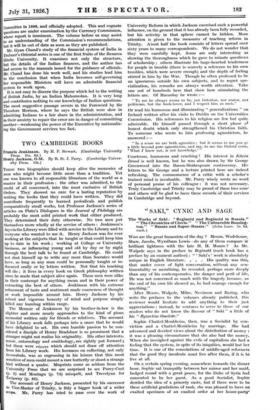TWO CAMBRIDGE BOOKS
THESE two biographies should keep alive the memories of men who might become little more than a tradition. Yet one was known to all responsible librarians of the world as a master in their profession : the other was admitted, to the credit of all concerned, into the most exclusive of British Orders. They showed no care for a lasting reputation by writing the books that they could have written. They did contribute frequently to learned periodicals and publish comparatively small works, but Professor Jackion's series of articles on Plato's Dialogues in the Journal of Philology are probably the most solid printed work that either produced. They determined their duty otherwise. No two men put themselves more wholly at the service of others : Jenkinson's days inthe Library were filled with service to the Library and to everyone who wanted to use it. Henry Jackson was for ever working at the subjects that he taught or that could keep him up to date in his work ; working at College or University business, or influencing young and old by day or by night through the best talk to be found at Cambridge. He could not shut himself up to write any more than Socratei would have, so long as any man could be personally taught or in- fluenced orally or by letters written. Not that his teaching will die ; it lives in every book on Greek philosophy written since he made that subject alive again. These men were alike in their contempt for anything mean and in their power of extracting the best of others. Jenkinson with his extreme refinement of taste and sentiment made coarseness of thought or work impossible around him. Henry Jackson by his robust and vigorous honesty of mind and purpose simply killed any humbug within range.
The Memoir of Jenkinson by his brother-in-law is the slighter and more nearly approaches to the kind of pious memorial written only for friends or relatives. The account of his Library work falls perhaps into a snare that he would have delighted to seta His own humble passion to be con- sidered a disciple of Henry Bradshaw is so prominent that a stranger might not realize his originality. His other interests, music, entomology and ornithology, are rightly put forward ; but these were irciperya which should not draw off attention from his Library work. His keenness on collecting, not only incunabula, was so engrossing in his leisure that this most sensitive of men could mount a rare butterfly or shoot a strange bird without a qualm. Misprints come so seldom from the University Press that we are surprised to see Purey-Cust (p. 2) and Montagu (p. 74) misspelt, and Trevelyan for 1'relawny (p. 85).
The account- of Henry Jackson, presented by his successor as Vice-Master of Trinity, is fitly a bigger book of a wider seoPe. Mr. Parry has tried to pass over the work of
University Reform in which Jackson exercised such a powerful influence, on the ground that it has already been fully recorded, but his activity in that sphere cannot be hidden. More attention is given to the measures of teaching reform in Trinity. About half the book consists of letters spread over sixty years to many correspondents. We do not wonder that they were carefully kept. Some are only interesting as showing the thoroughness which he gave to minute questions of scholarship ; others illustrate his large-hearted tenderness for people in trouble (there is scarcely a reference to his own troubles, which were severe enough) and the depth of feeling stirred in him by the War. Though he often professed to be an ignoramus outside his own subjects, and to regret spe- cialization, his remarks are always worth attention. Take one out of hundreds here that show how stimulating the letters are. Of Macaulay he wrote :-
" To me he always seems to be, not historian, nor orator, not politician, but the book-lover, and I respect him as such."
Or read his humorous and illuminating " generalizations " on Ireland written after his visits to Dublin on the Universities Commission. His references to his religion are few but quite admirable. He himself passed through a short phase of honest doubt which only strengthened his Christian faith. To someone who wrote to him professing agnosticism, he answered :—
" In a sense we are both agnostics ; but it seems to me you go a little beyond pure agnosticism, and say, to use the Oxford verse, ' What I know not, is not knowledge.' "
Courteous, humorous and crushing His interest in Edwin
Drood is well known, but he was also drawn by Sir George Greenwood into the Bacon-Shakespeare controversy. Hi 3
letters to Sir George and a lecture printed here are indeed refreshing. The commonsense of a critic with a scholar's trained mind is invaluable. Mr. Parry wisely wrote no word of personal praise of his colleague : it was not necessary. Truly Cambridge and Trinity may be proud of these two sons' and others will be glad to have these records of their services in Cambridge and beyond.


































 Previous page
Previous page